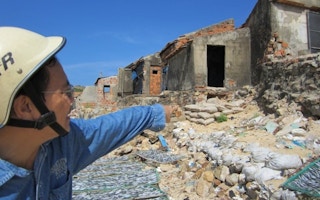Viet Nam lacks a comprehensive strategy to cope with coastal erosion, which is recognised as one of the major consequences of rising sea levels, experts have warned.
The speed of erosion has increased year-on-year, with coasts being affected depending on their structure and use by local residents, said Le Van Cong, Deputy Head of the Viet Nam Administration of Seas and Islands’ Oceanography Centre.
Cong, who was speaking at a recent workshop held in Ha Noi, added that between 15-30 metres of coast was being lost per year in Thanh Hoa and Tien Giang provinces and between 10-20 metres in HCM City and Tra Vinh Province.
The stretches of coastline that have suffered the most from coastal erosion since 1990 are located in seven provinces of Binh Thuan, Quang Nam, Quang Ngai, Phu Yen, Thanh Hoa and Thua Thien Hue.
Head of the latter’s Seas and Islands Division Dang Xuan Dung said, “The erosion has posed a threat to lives of hundreds of local residents and their homes.”
Thua Thien Hue now has a 30-km stretch of eroded coastline, about one-third of which is extreme, he said.
According to Cong, the higher frequency and intensity of tropical storms, over exploitation of sand and reef, and mangrove deforestation were to blame for the increase of coastal erosion in the country.
Statistics released by the National Centre for Hydro-Meteorology Forecasting showed that a total of 246 tropical storms hit Viet Nam between 1961 and 2010. While there were three storms in 1961, the number was 10 in 2008.
Deputy Head of Seas and Islands Administration Vu Si Tuan said that public awareness of disaster mitigation was still limited and had worsened the situation.
“Financial resources have not been enough to prevent coastal erosion,” he said.
Overlapping and inconsistent environmental protection policies had made it difficult for authorised agencies to cope with coastal erosion, he added.
Director of the Research Institute for the Management of Seas and Islands Vu Thanh Ca said, “Resorts along the coastline have mushroomed, also raising the level of coastal erosion.”
Cong commented that the Government had actively prepared to combat the problem, but its efforts had been stalled by the economic slowdown and it was now relying on international aid.
In the meantime, he revealed the administration of seas and islands plans to complete the National Report on Viet Nam Coastal Erosion, assessing the problems and recommending solutions.
Cong said that a pilot model to prevent coastal erosion is set to be implemented over a 102-km stretch of eroded coastline in central Thanh Hoa Province’s Quang Cu Commune in 2014-15, at an estimated cost of US$150,000.
The commune has lost about 20,000 square metres of land and 15,000 square metres of forest due to coastal erosion since 2005.
The Coordinating Body on the Seas of East Asia (COBSEA) Consultant Reynaldo Molina recommended that Viet Nam should quickly build a policy system and an observation network to manage the nation’s coastal erosion.
In 2009, COBSEA helped Viet Nam and other regional countries to develop the ‘COBSEA Regional Programme for the Sustainable and Ecosystem-Based Management of Coastal Erosion in the East Asian Seas Region.’
Viet Nam, with a coastline stretching over 3,200km in 28 coastal provinces and cities, is one of the most vulnerable countries to the impacts of climate change.

















